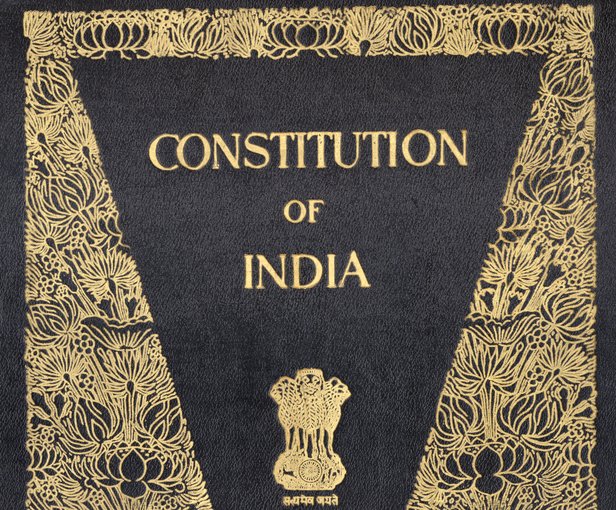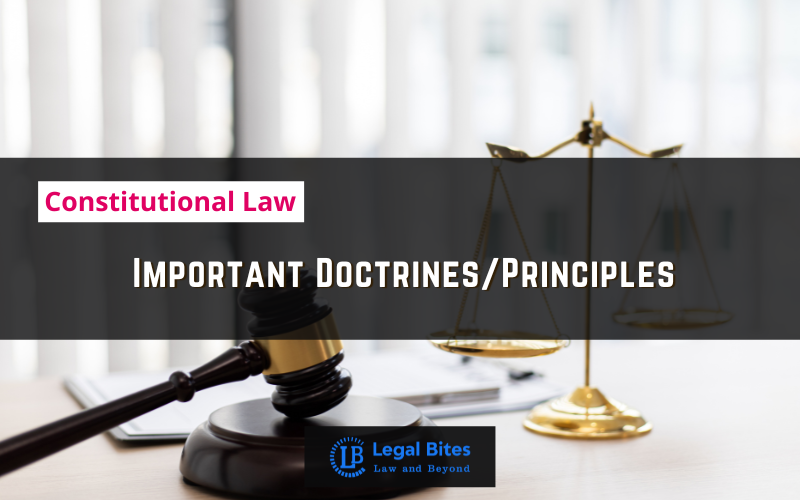Meaning Of Law Under Article 13
Meaning Of Law Under Article 13 | Overview Retrospective effect The doctrine of eclipse The doctrine of Severability Future Laws The expression ‘law’ which is used in Article 13 has been given a wider connotation so as to include any ordinance, order, bye-laws, rule, regulation, notification, custom or usage having in the territory of India the force of… Read More »
;
Meaning Of Law Under Article 13 | Overview Retrospective effect The doctrine of eclipse The doctrine of Severability Future Laws The expression ‘law’ which is used in Article 13 has been given a wider connotation so as to include any ordinance, order, bye-laws, rule, regulation, notification, custom or usage having in the territory of India the force of law. This means that not only a piece of legislation but any of the things mentioned here can be challenged as infringing a...
Meaning Of Law Under Article 13 | Overview
The expression ‘law’ which is used in Article 13 has been given a wider connotation so as to include any ordinance, order, bye-laws, rule, regulation, notification, custom or usage having in the territory of India the force of law. This means that not only a piece of legislation but any of the things mentioned here can be challenged as infringing a Fundamental Right.
It is clear from the wordings of clause (3)(a) of Article 13 of the Constitution that it includes both the law made by legislature as well as those orders or notification which abridges or takes away any of the fundamental rights given in Part III of the Constitution would be void. According, inter alia the following have been held to be ‘law’ under Article 13, the validity of which can be tested on the touchstone of Fundamental Right:
- a resolution passed by a State Government under Fundamental Rule 44 of the State;[1]
- a government notification under the Commissions of Inquiry Act setting up a commission of inquiry;[2]
- A notification or an order under a statute;[3]
- An administrative order, but administrative instruction is not law within the meaning of Article 13;[4]
- A custom or usage;[5]
- Bye-laws of municipal or a statutory body;[6]
- Regulations made by a statutory corporation life the Life Insurance Corporation.[7]
The validity of the above can be questioned under the Fundamental Rights.
The co-operative society frames any bye-laws under the Co-operative Society Act then it does not fall within the purview of Article 13. Parliament, while making an Act cannot be deemed to have into consideration an earlier law found to be in contravention of Article 13.[8]
Such a law may not be said to be invalid but the order under it might be challenged on the ground of being inconsistent with fundamental rights because one cannot presume that law authorizes anything that is unconstitutional.[9]
One point needs to be emphasized. A restriction on a Fundamental Right can be imposed only through a statute, statutory rule or regulation. A fundamental right cannot be put under restraint merely by an administrative direction not having the force of law.[10]
Article 13 of the constitution of India, 1950 states that:
“Laws inconsistent with or in derogation of the fundamental rights
- All laws in force in the territory of India immediately before the commencement of this Constitution, in so far as they are inconsistent with the provisions of this Part, shall, to the extent of such inconsistency, be void
- The State shall not make any law which takes away or abridges the rights conferred by this Part and any law made in contravention of this clause shall, to the extent of the contravention, be void
- In this article, unless the context otherwise requires law includes any Ordinance, order, bye-law, rule, regulation, notification, custom or usages having in the territory of India the force of law; laws in force includes laws passed or made by Legislature or other competent authority in the territory of India before the commencement of this Constitution and not previously repealed, notwithstanding that any such law or any part thereof may not be then in operation either at all or in particular areas
- Nothing in this article shall apply to any amendment of this Constitution made under Article 368Right of Equality.”
From the bare perusal of the Article it is clear that Article 13 consists of two parts are as follows:-
- Pre constitutional laws [Article 13(1)];
- Post constitutional laws [Article 13(2)].
Retrospective effect: According to article 13(1) any existing law which is in conflict with the any of the provisions enshrined in part III of the constitution i:e fundamental rights at the time of commencement of constitution then any such law will be declared as a void to the extent of the inconsistency.
Article 13(1) does not give retrospective effect to the application of fundamental rights. Article 13(1) is of prospective effect. All laws in contravention to the provisions of the Constitution only become void just from the commencement of the constitution.
Thus, past transactions and closed actions or any substantive rights or liabilities existing before the commencement of the Constitution are not affected by Article 13(1).[11] But that doesn’t mean that any procedure laid down in any law before the commencement of constitution which is contrary to any of the provisions of part III of the constitution will be allowed to continue even after the commencement of constitution in pending proceedings.
However, if the proceedings are closed before the commencement of the constitution then Article 13(1) will have no effect on it i:e it will not act retrospectively to declare it as void.[12]
The doctrine of eclipse
This doctrine simply states that any law which is contrary to fundamental rights enshrined in Part III of the constitution is not void but becomes unenforceable i:e it becomes dormant for an infinite period of time until the inconsistency is removed from it.
The apex court of India evolved this doctrine in the case of Bhikaji v. State of Madhya Pradesh[13] in this case court held that any law existing before the commencement of the constitution which is inconsistent with any of the provisions mentioned in Part III of the constitution is simply not void but becomes unenforceable.
The doctrine of Severability
From the word severability, it is clear that it means to separate. According to this doctrine, not the whole act is considered void but only the impugned part which is contrary to the provisions of Part III is considered void provided that the impugned act is separable.
Supreme Court in A.K Gopalan[14] Case used this doctrine to decide the matter. Where Section 14 of the Preventive Detention Act, 1950 was declared as void and the rest of the act was valid. In the RMDC v. UOI[15], the apex court laid down following rules regarding the use of Doctrine of severability:-
- The intention of the legislature behind enacting the ACT is important to decide whether the impugned part is separable from the whole act or not.
- If the impugned provision is not separable from the whole act then the whole act will be considered as void.
- If the impugned provision is separable from the whole Act but the whole of the act forms a part of a single scheme which was intended to operate as a whole then also the whole act will be considered as void.
Future Laws
According to Article 13 of the constitution, the state is not allowed to any law which is in contravention to Part III of the Constitution of India. However, if such law is made it will be declared as void.
A question of great importance which has been debated in India from time to time is whether the term ‘law’ in Article 13(1) would include an Act passed by Parliament to amend the Constitution. Since 1951, the issue which is faced about the scope of the constitutional amending process contained in Article 368. There had been several amendments that have been effectuated in the Fundamental Rights.
According to 24th Amendment of the Indian Constitution, this question has been clearly answered and also referring numerous judgments of Supreme Court which has ruled that Article 13 only refers to legislative laws and not to constituent law, where legislative laws are the ordinary laws made by legislature whereas constituent laws are made to amend the constitution by exhausting constituent power.
Therefore, the word ‘law’ under Article 13 did not include the constitutional amendments made by Parliament through Article 368 of the Constitution.
[1] State of Madhya Pradesh v. Mandawar, AIR 1954 SC 493.
[2] Dalmia v. Justice Tendolkar, AIR 1958 SC 538.
[3] Madhubhai Amathalal Gandhi v. Union of India, AIR 1961 SC 21.
[4] Punit Rai v. Dinesh Chaudhary, AIR 2003 SC 4355.
[5] Sant Ram v. Labh Singh, AIR 1965 SC 314.
[6] Tahir v. District Board, AIR 1954 SC 630.
[7] Hirendra Nath Bakshi v. Life Insurance Corp., AIR 1976 Cal.88.
[8] Jain MP, Indian Constitutional law, (7th ed, 2014) p. 867.
[9] Narendra Kumar v. Union of India, AIR 1960 SC 430.
[10] Kharak Singh v. State of UP, AIR 1963 SC 1295.
[11]Keshavan Madhavan Menon v. State of Bombay, AIR 1951 SC 128.
[12]Abdul Khader v. the State of Mysore, AIR 1953 SC 355.
[13]AIR 1955 SC 781.
[14]A.K. Gopalan v. the State of Madras, A.I.R. 1950 SC 27.
[15]AIR 1957 SC 628.




